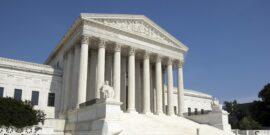Paulsen on Departmentalism versus Judicial Supremacy
I have started a series of posts on the departmentalism – judicial supremacy debate in an effort to explain my position, which inclines towards, but does not go all the way towards judicial supremacy. But I am going to interrupt that planned series to briefly respond to a post written by my former Yale Law School classmate and OLC colleague Mike Paulsen. Mike sets up a “horrible hypothetical” – one that involves a horrible situation – involving an awful law that prohibits speech that the First Amendment protects, punishes its violation with torture that violates the Eighth Amendment, and unconstitutionally prohibits the President from pardoning the persons convicted. (It also violates other clauses as well.) The Supreme Court then upholds the constitutionality of the law as to an individual. Mike asks, among other things, whether the President is constitutionally obligated to enforce the law.
Legally, the answer would seem to be clear. The courts, with Supreme Court review, have issued a judgment that requires the torturous punishment and prohibits pardons. But Mike’s horrible hypothetical appears designed to make us resist this conclusion – it is just such a horrible decision and outcome! But there are several reasons that allow us to easily avoid the pull of this hypothetical.
First, the situation Mike envisions is extremely unlikely. There is a wide consensus these days that the law would be unconstitutional. It would not be enacted into law by both houses of Congress and the President. And it would not be approved by the courts, including the Supreme Court.
A law professor can always come up with unrealistic, horrible hypotheticals. We should answer them, but we should also eschew their emotional pull when they are unrealistic. Mike is a believer in a broad Commerce Clause. I could imagine hateful and horrible laws that Congress might enact that Mike would presumably believe were constitutional. That does not make his reading of the Commerce Clause wrong (although I do believe in a much narrower reading of the Clause than he does on other grounds).
More to the point, one can easily change the hypothetical so that it pulls in the opposite direction. Suppose that the President asserts the right to summarily execute people who criticize the government. The executive arrests an individual, who successful seeks a writ of habeas corpus in the courts. The President then refuses to follow the writ, claiming it is unconstitutional, and executes the person. Pretty horrible as well – and one could easily add all kinds of wrinkles to make it worse.
Second, whatever one thinks about the First Amendment and Eighth Amendment violations, the violation of the Pardon Power is absolutely clear. It is inconceivable that the courts would approve of this. And if the Pardon Power were allowed, then the President has an easy response to the problem: he pardons the person who has been convicted.
Third, the hypothetical is problematic because it neglects the essentials of the rule of law. The law, especially when it appropriately consists of rules, will sometimes lead to bad results. That is the price we pay for the constraining of discretion that is essential to tolerable government. The trick is to have rules and procedures that minimize the extent to which there are bad results.
The original meaning of the U.S. Constitution, as amended, does a good job of minimizing those bad results. Mike has to come up with such an unrealistic hypothetical because our system would guard against this problem. If one wants to make this type of argument – and it is not clear that such arguments are relevant to the original meaning – one needs to look at the overall consequences from the two competing interpretations. And I am confident that we are safer with the checks from the courts than from the unilateral actions of a president.
Finally, let’s suppose that the law does get passed and approved. What should the President do? Even though he has a legal obligation to enforce it, I would argue that he should not do so. The law is an important value, but not the only the value and not always the highest value. The President could announce that he is going to pardon the individual, that he regards the law as seriously unconstitutional, and that the Congress can judge him as they will in any impeachment proceeding that they might decide to bring.

